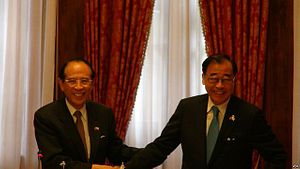On March 11, 2011, eastern Japan was struck by a massive earthquake. The damage wrought by the earthquake was extensive due to a compounding of three factors: the earthquake itself, the ensuing tsunami and the nuclear disaster. In addition to the efforts of the Japanese national and local governments, and thanks to assistance from other countries and action from NGOs and other private sector groups, the affected areas continue to make progress in recovering from the disaster. Stand in front of a station in Sendai, one of the affected areas, and you may be hard pressed to imagine that a major earthquake struck the location seven years prior.
In contrast, for the Fukushima Daiichi Nuclear Power Plant, any semblance of “recovery” remains a distant prospect, and many displaced citizens are still unable to return to their homes today. It is equally hard to describe radiation levels as being under control in the area. That said, agricultural produce from Fukushima Prefecture is already being distributed on the Japanese market, underpinned by requirements such as radiation testing. Consumers, however, take a less forgiving approach and represent yet another hurdle to the region’s recovery.
The Great East Japan Earthquake was also an opportunity to clarify the role of Japan’s relationships with other countries, typified by the Japan-U.S. alliance and Japan’s close ties with Australia. The Japan-U.S. alliance was on display in tangible form, with a U.S. aircraft carrier serving as a seaborne base for disaster relief, and many Japanese remember how U.S. forces restored Sendai Airport to operational status. But one relationship that is important in terms of how significantly it changed following the earthquake is that of Japan and Taiwan.
It is well known that Japan does not maintain diplomatic relations with the Republic of China (Taiwan), which have remained severed since September 1972. Yet in the wake of the Great East Japan Earthquake, Japan received more than 20 billion yen in donations from Taiwanese society. Despite the difficulty in providing government-level support due to the lack of diplomatic ties, private support from Taiwan surpassed the amount offered by the United States, a fact that was widely covered by the Japanese media and left an impression on many Japanese. A “Thank You Taiwan” movement even propagated across social media.
As a consequence, debate has swirled in Japanese society as to whether Japan can return the favor to Taiwan in the form of policy, and that in turn has given rise to the notion that Japan should provide support to Taiwan in the event it experiences a disaster itself. The Democratic Party of Japan (DPJ) government at the time was roundly criticized for what was perceived as unjust treatment of a representative of Taiwan living in Tokyo at a certain ceremony. Although the DPJ was in fact following established protocol, the general public was not happy. The DPJ administration of Yoshihiko Noda, however, worked to strengthen ties with Taiwan, and swiftly resolved a number of pending issues, such as agreements on investment and open skies initiatives.
The newly formed Liberal Democratic Party government of Shinzo Abe continued with these policies, and in April 2013 signed a fishing treaty with Taiwan, while avoiding the sovereignty issue surrounding the Senkaku Islands. These developments represented real progress in Japan-Taiwan relations, all brought about by the Great East Japan Earthquake.
What is interesting is that this progress occurred under Taiwan’s Ma Ying-jeou administration. At the time, the People’s Republic of China had not adopted a particularly strict stance on Ma’s diplomatic policies. That enabled Japan-Taiwan ties to improve even as relations between Japan and China deteriorated. In the fall of 2015, ahead of Taiwan’s 2016 general election, Tsai Ing-wen, then the leading candidate in Taiwan’s Democratic Progressive Party, visited Japan and was reported to have met with Prime Minister Shinzo Abe. During the trip, Tsai also visited Yamaguchi Prefecture, home to Abe’s electoral district. In January 2016, Tsai was elected and subsequently took office in May, bolstering chances of further improvements in Japan-Taiwan relations.
The centerpiece of this new era in bilateral relations was a free trade agreement. Ahead of negotiations, the Japanese side focused on two issues, first a resolution to the Okinotorishima issue raised by Ma Ying-jeou towards the end of his administration, and second the rescission of the ban on the import of foods from Fukushima and several neighboring prefectures. However, while the Tsai administration was able to resolve the first issue, an agreement could not be reached on the second. This became a critical factor impeding the betterment of relations between Japan and Taiwan.
Why is this issue so important, particularly for the Japanese? The answer is clear if you consider why Japanese society wants ties with Taiwan to improve. It was the generous support Taiwan offered to stricken regions in the wake of the Great East Japan Earthquake that motivated the Japanese people, and that also set the tone for the strengthening of ties. However, Taiwan has labeled foods from the affected regions that are being distributed in the Japanese market as “radiation foods” and has refused to lift the ban on their import, a stance that appears at odds with the generous support Taiwanese offered to the affected areas. That is why this issue has developed into a new problem between Japan and Taiwan.
Of course, Taiwan has its own internal issues to deal with, including elections. But seven years after the earthquake, it seems a great shame that the import ban should come between the two neighbors.
Shin Kawashima is a professor at the University of Tokyo.

































